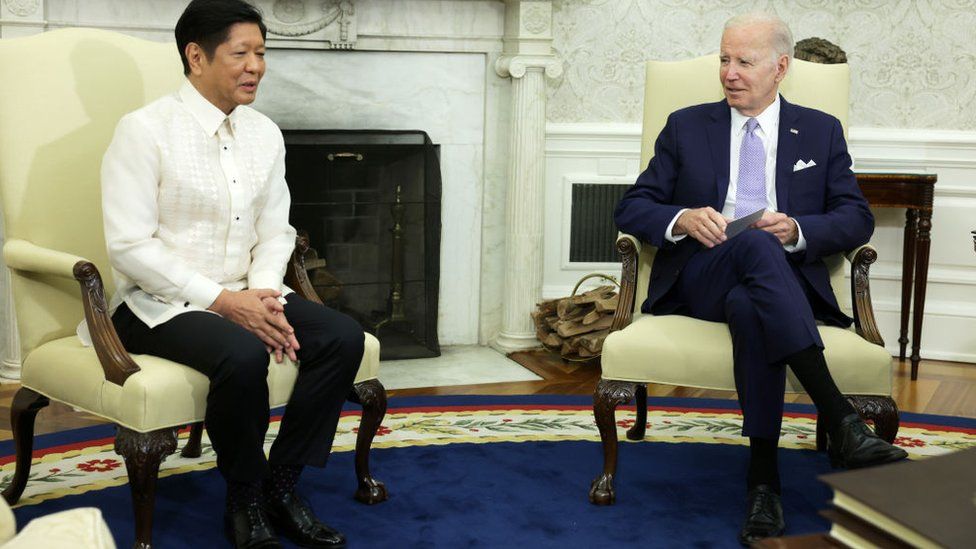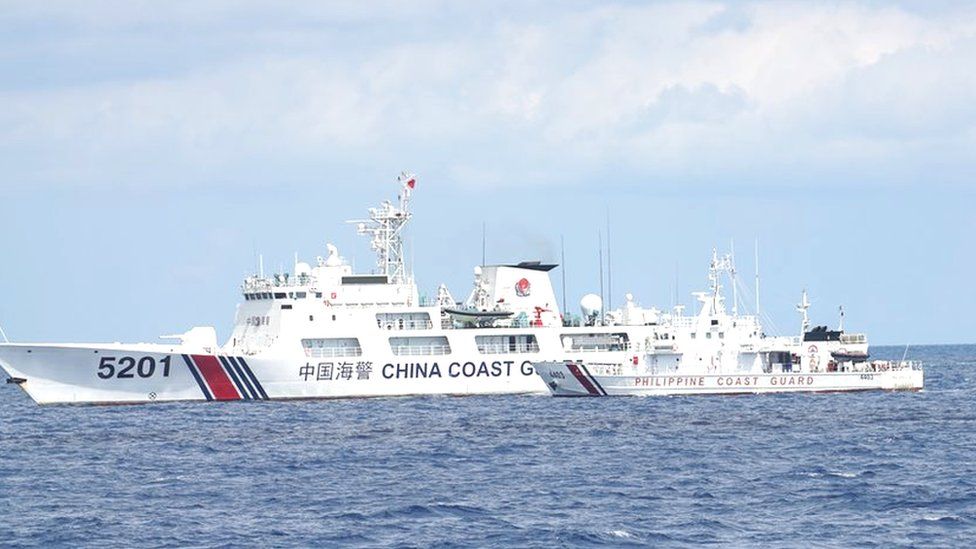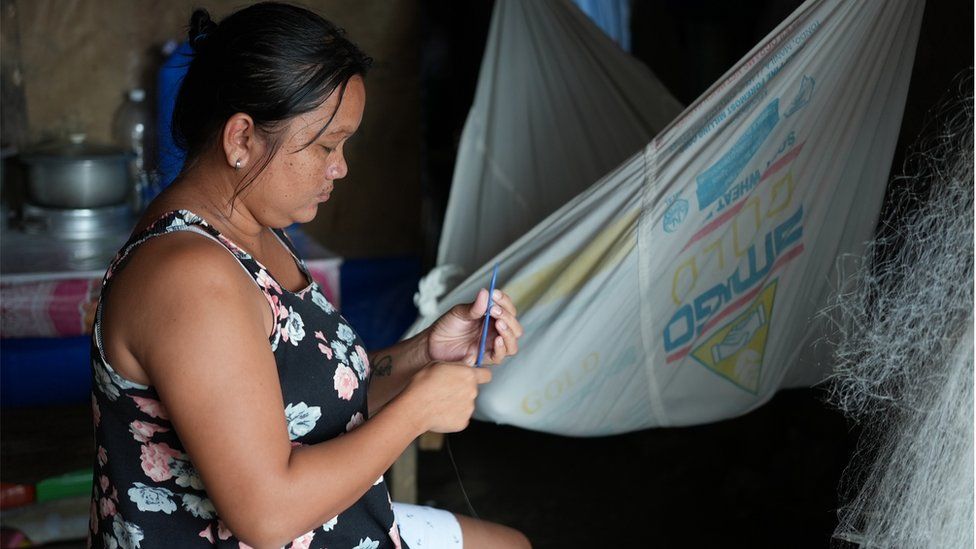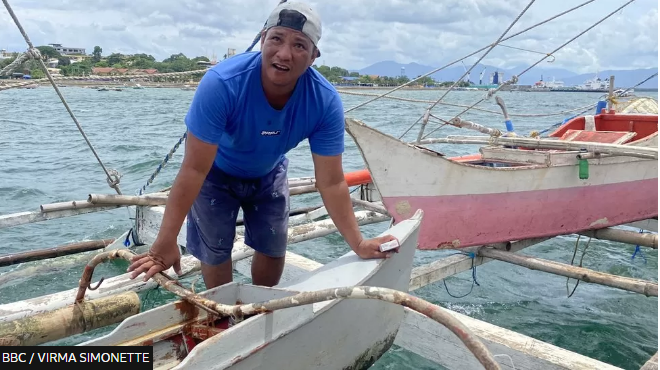"We're scared of China," fisherman Benjo Atay says as wind and rain batter his small bamboo boat on the island of Palawan in the Philippines.
He shouts orders at his young crew, most of them family, as they haul on ropes to navigate out of the port. They are already bathed in salt water and sweat - but it is not the weather that frightens them.
"The Chinese ships circle us and shadow us," he says. "When we are anchored... they would force us to leave. They would get rid of us."
The Philippines is at the centre of a tense territorial standoff with Beijing in the South China Sea.
Where previously Manila may have softly whimpered at China's actions to block its ships, its voice has now soared to a roar, emboldened by support from Washington and its allies.
"We are worried [about rising tensions], of course, but that doesn't daunt us," said Jonathan E Malaya, the assistant director general of the Philippines National Security Council.
In recent months, the Philippines has given the US access to key military bases, hosted the largest-ever joint military drills between the two countries, and repeatedly called out Beijing's aggression in the South China Sea. Even as Philippine and Chinese coastguards engage in a now-familiar cat-and-mouse game on the disputed waters, Manila has announced plans to train fishermen to protect their territory out at sea.
The message is clear. "If you are a Filipino, whether in government or [the] private sector, regardless of your politics, defending and making excuses for China's aggressive behaviour should deem you unpatriotic, and a traitor to the Philippines and to our people," Jay Tarriela, a spokesperson for the coastguard in the West Philippine Sea wrote on social media.
China's claims, which extend to all of the South China Sea, rival not just the Philippines but also Vietnam, Taiwan, Malaysia and Brunei. These are not new but they are getting louder - and dicier.
The latest episode revolves around the remote Ayungin shoal that lies more than 620 miles (998km) from mainland China's southernmost shore, and around 120 miles from Palawan island.

Chinese vessels have used water cannon and lasers to deter the Philippine coastguard from getting close to the shoal in the last six months. The boats were carrying essential water and food to troops aboard a rusting warship - named Sierra Madre - that Manila intentionally grounded on a reef in their waters. It was a determined and calculated move to try to keep a presence on the shoal.
This is territory the Philippines won in an international court in 2016, after a tribunal said Beijing's sweeping claim to sovereignty over most of the South China Sea had no legal basis.
These are lucrative fishing grounds and access to the shoal also means access to nearby Reed Bank, which has significant reserves of oil and natural gas.
Seemingly undeterred by Chinese might, the Philippines tried again to send supplies to its troops on the Sierra Madre - this time, they said they were successful.
"It really is a David versus Goliath issue," Mr Malaya said. "But just like David, we will continue to pound and double down on the need to protect the resources which are important for the future of the Philippines."
But Beijing does not see it that way. It claims the Sierra Madre is violating its sovereignty. A Chinese coastguard statement described its actions to use a water cannon on the Filipino vessel as "professional and restrained".
Manila said it tried to use a hotline it set up with China to defuse the situation, but no-one answered the phone.
"We would like to resolve this issue," said Mr Malaya, but admitted that "progress is slow and there is, at present, no meeting of the minds".
Unlike his predecessor, Rodrigo Duterte, who sought to court, rather than criticise, China, President Ferdinand "Bongbong" Marcos has shifted closer to Washington.
He has also made each spat with Beijing in the South China Sea public. If the Philippine coastguard struggles to re-supply the grounded ship on Ayungin shoal, it is televised. Crucially, the US is not too far away. President Marcos with US President Joe Biden during a visit to the White House in May
President Marcos with US President Joe Biden during a visit to the White House in May
China's "aggressive behaviour" in the South China Sea must be challenged and checked, the commander of the US Navy's Seventh Fleet said earlier this week.
Vice Admiral Karl Thomas assured Manila it had US backing in the face of "shared challenges" in the region. "My forces are out here for a reason," he told Reuters news agency. "You have to challenge people I would say operating in a grey zone. When they're taking a little bit more and more and pushing you, you've got to push back, you have to sail and operate."
Beijing responded by accusing the US of distorting the facts and sowing discord to "project power".
Washington was once ambiguous about Beijing's actions in the South China Sea, and some nations in this region are still never sure they can trust its message of support. A change of administration can also mean a change of heart.
But for now the US is demonstrating that it will show up for its allies in Asia. And it's not just the US that has been showing up in the South China Sea.
Last week, the US, Japan and Australia held joint drills with the Philippines, which Tokyo's ambassador to Manila described as a "significant moment of defence". Forces from Australia and the Philippines also took part in the largest-ever military exercises held between the two nations, which included a mock beach landing and air assault manoeuvres near the South China Sea.
Nowhere else do so many nations come so close to a rival force, which raises fears of a miscalculation during these sea skirmishes.

Standoffs in the South China Sea are growing between the Philippines and China
For Manila, allied help also comes with the risk of escalating the dispute. But that is a risk Palawan's fishermen may not be willing to take.
The Philippine Army Chief of Staff, Romeo Brawner, recently said they plan to recruit fishermen as reservists and train them. The regional officer for the Kalayaan Palawan Farmers and Fisherfolks Association, Larry Hugo, laughed when the BBC asked him if he knew many fishermen prepared to join such a militia.
"No, no, we don't want to join," he said. "It's hard if China would detect us. Fishermen from here will be targeted. The Chinese are becoming more aggressive. They've increased in numbers too."
Mr Malaya from the Philippines National Security Council says the Chinese are also using hundreds of fishing vessels near the Ayungin shoal, which are in effect militia vessels.
"They are instruments of Chinese power, they are part of the military apparatus of China. They serve to intimidate and harass our fishermen in the area," he added.
Beijing, however, denies that such a militia exists.
Whether it does or not, Benjo Atay says he is not prepared to even risk sailing near those waters, let alone fight.
He has fished near Ayungin shoal since he was 14. It is named after the near-endangered fish endemic to the Philippines, well-known to families living off a tight budget.
There was a time when, for months, he and other fishermen from the scattered islands near Palawan sailed close to Chinese boats in the same waters.
Now in his 30s, Mr Atay's concern for the crew's safety outweighs the lure of a significant catch.
"I don't think we will go back there. We are really scared. They might fire their water cannon. Of course, we just have a wooden boat. We're really afraid of going back there."
 The coastal communities of Palawan depend on fishing for their livelihoods
The coastal communities of Palawan depend on fishing for their livelihoods
The crystal-clear turquoise seas and white sands of Palawan are idyllic. But to survive here, if you do not fish, you do not eat.
For generations, the people of this island have carved out communities from rocky bays and sandy shores: single-room homes with corrugated iron roofs where babies sleep in hammocks strung across the kitchen.
A storm has grounded most of the boats, so some venture out on foot into the shallows to wade with nets and buckets for shellfish. Others are using the time to repair boats and nets.
The children have a day off school and battle on a makeshift basketball court surrounded by the resting upturned boats. Some of them say they want to be professional basketball players, but when asked if they want to be fishermen, the answer is a resounding yes.
"It's getting harder each year," Mr Atay says. "How could we work properly when we're afraid? We can't focus on fishing so we just stay on the island where we Filipinos are allowed."
These communities are determined to keep their heads down during these territorial disputes. But their future may depend on any outcome.
That future was once dependant on wind and tide. Now it will depend on the resolve of world leaders.
Latest Stories
-
Expansion Drive: Takoradi Technical University increases faculties
2 hours -
SHS heads demand payment of outstanding funds before reopening of schools
3 hours -
We thank God for the 2024 general elections – Akufo-Addo
3 hours -
Coconut Grove Beach Resort marks 30 years of excellence with memorable 9 lessons & carols service
3 hours -
WAFU B U-17 Girls’ Cup: Black Maidens beat Nigeria on penalties to win inaugral tournament
4 hours -
Real Madrid beat Sevilla to keep pressure on leaders Atletico
5 hours -
Liverpool put six past Spurs to go four points clear
5 hours -
Manchester United lose 3-0 at home to Bournemouth yet again
5 hours -
CHAN 2024Q: ‘It’s still an open game’ – Didi on Ghana’s draw with Nigeria
5 hours -
CHAN 2024Q: Ghana’s Black Galaxies held by Nigeria in first-leg tie
6 hours -
Dr Nduom hopeful defunct GN bank will be restored under Mahama administration
7 hours -
Bridget Bonnie celebrates NDC Victory, champions hope for women and youth
7 hours -
Shamima Muslim urges youth to lead Ghana’s renewal at 18Plus4NDC anniversary
8 hours -
Akufo-Addo condemns post-election violence, blames NDC
8 hours -
DAMC, Free Food Company, to distribute 10,000 packs of food to street kids
10 hours

